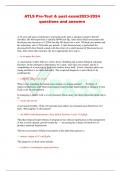Exam (elaborations)
NUR 2063 Pathophysiology Final Exam LATEST UPDATE 2023 GRADED/A
- Course
- Institution
NUR 2063 Pathophysiology Final Exam LATEST UPDATE 2023 GRADED/A 1. If a patient reports SOB, which term below describes this feeling? a. sign b. symptom c. contraindication d. objective data Answer: symptom 2. thyroid gland is located where? a. head b. throat c. chest d. neck Answer:...
[Show more]



